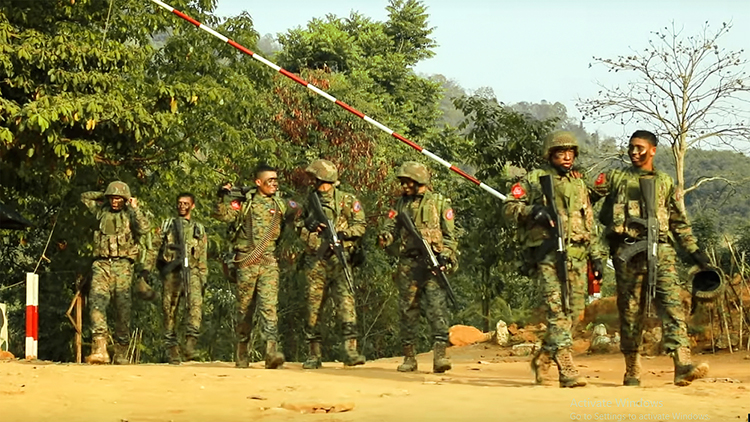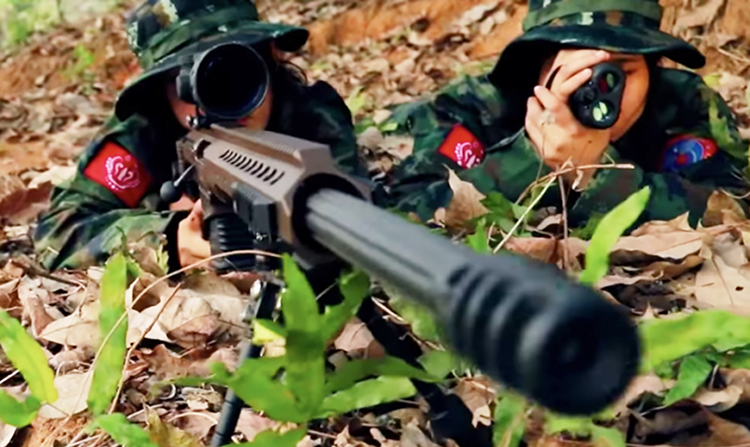- A Glimpse Into the 2026 Arakan State Parliament
- Junta airstrikes target military outposts seized by Arakan Army in Arakan State
- Motorbike spare part prices skyrocket in Arakan State amid tighter traffic rules
- Kyauktaw IDP camps struggle with inadequate latrines
- Religious freedom, interfaith harmony expand in areas controlled by AA in Arakan State
AA’s 10-year revolution
The AA participated in the peace process from 2012 to 2015 together with other ethnic armed groups, especially in nationwide ceasefire talks. However, in the latest peace dialogues between former president U Thein Sein and ethnic armed groups, three northern alliances including the AA were excluded.
03 Jun 2019

Tun Tun Naing | DMG
It has now been a decade since the Arakan Army commenced its armed struggle. The AA was founded on April 10 in 2009 with 26 Arakanese youths in the headquarters of the Kachin Independence Army (KIA).
In the beginning, the KIA furnished not only funds and weapons, but also provided training for them. In addition, the AA was provided aid from the Wa (Wa state) and Kokant who are members of the Northern Alliance.
Ethnic groups participated in armed conflicts in northern Shan State together with the MNDAA and the TNLA, so the AA acquired some combat experience.
After being provided military training from the KIA, the AA tried to return to Arakan State in 2011 to fight for self-determination. However, the battles between the Tatmadaw and the KIA put the AA’s mission on hold because they had to stand with the KIA in the conflict against the Tatmadaw.
A video titled “The Way of Rakhita” was one of the pillars to boost the AA’s power both politically and militarily. The theme of “Arakan Dream 2020” is a part of the way of Rakhita to mobilize Arakanese people.
Currently, the AA has received full support of Arakanese people from all social strata.
During the period now between 2019 to 2020 the AA decided to start an Arakanese revolution in 2020 under the theme of the “Arakan Dream 2020”.
Over a decade, the AA conscripted over 7000 volunteer fighters and began its attempt to return to Arakan State from Kachin through Paletwa Township in Chin state in 2014. The AA has prepared for more than four years to be able to settle in Arakan State.
After 2015 the AA extended their presence into some towns in northern Arakan State such as Rathedaung, Kyauktaw, Mrauk-U and Buthidaung, resulting in nasty shootouts with the Tatmadaw. The Tatmadaw and the government are not pleased with the AA’s settlement in Arakan State and see it as a threat to peace and security of the region.
However, AA members that were born among Arakanese people have vowed to fortify their headquarters in Arakan State and authorities from the AA said that they will take responsibility for protecting Arakanese people and their rights for self-determination.
On January 4, the AA launched a series of coordinated attacks on four police outposts in northern Arakan State. The AA said that the attack was conducted for political and military reasons. After the attack, the AA was recognized as a terrorist insurgent group after an emergency coordination meeting on defense and security that was held at the President’s House, and State Counsellor Aung San Suu Kyi ordered the Tatmadaw to quash the AA.
Then the Tatmadaw assaulted the AA using heavy artillery and air strikes, local residents said.
Recently, the ongoing battles between the Tatmadaw and the AA are escalating, with consequential casualties on both sides including collateral damage. Moreover, the number of war refugees has reached over 30,000 following the detention of civilians for interrogation and indiscriminate gunfire at residential areas that raise security concerns among local residents.

Politics and Peace
The United League of Arakan (ULA) was established in 2016 in the AA’s first plenary session held at a border area between Myanmar with China. Major General Twan Mrat Naing is chairman of the AA/ ULA and the Secretary General is Dr. Nyo Tun Aung.
The AA’s political purpose is to acknowledge Arakan State at the confederate level like Wa State that’s been granted the highest power in accord with the constitution. Commander in chief of the AA Major General Twan Mrat Naing said in an interview with the Irrawaddy news agency that he would prefer to be a confederate state because it is essential for Arakan’s history and the hope of Arakan’s people.
For the Tatmadaw and the government, the AA’s recent political and military actions in northern Arakan State are believed to be a threat to the security, development and democratic reforms.
The military officials said that Major General Twan Mrat Naing can keep on participating in ongoing peace talks only if he changes his attitude and actions.
The AA participated in the peace process from 2012 to 2015 together with other ethnic armed groups, especially in nationwide ceasefire talks. However, in the latest peace dialogues between former president U Thein Sein and ethnic armed groups, three northern alliances including the AA were excluded.
The government said that the three northern ethnic groups must disarm before they can participate in the 21st Century Panglong Conference. But they lost their way to participate in negotiations after they announced that they would find a solution using alternative approaches.
The AA attended peace talks held in Pan San in Wa state in 2015 and had good relations with the UWSA. Due to the intervention of the UWSA before the 21st Century Panglong Conference, the NRPC met with the MNDAA and TNLA.
The AA and its northern alliance with the UWSA, KIA, SSPP/SSA, NDAA, MNDAA and TNLA_ established the Federal Political Negotiation and Consultative Committee (FPNCC) to conduct peace dialogues with the government. The FPNCC demanded that the Tatmadaw engage in dialogues with the committee and not with each group. It said it would find a new way to reach peace by circumventing the NCA the Tatmadaw is presiding over.
Along with the northern alliance, the AA first attended the 2nd session of the 21st Century Panglong Conference, held by the NLD government led by Daw Aung San Suu Kyi to resolve over 70 long years of civil war and political upheaval from May 24 to 29 in 2017, as a special guest under the auspices of the Chinese government.

The three northern alliances including the AA that attended the 21st Century Panglong Conference got a chance to meet with Daw Aung San Suu Kyi and U Aye Thar Aung at an informal meeting, hoping for a prospect of a peace settlement.
However, the Tatmadaw declared a unilateral four-month ceasefire on December 21 in five commands where ongoing armed conflicts are occurring. It also announced that it will engage in peace talks with non-signatories of the NCA. The Tatmadaw’s ceasefire does not include Arakan State where the Tatmadaw and the AA are fighting.
U Zaw Htay, spokesperson of the President’s Office, said that Arakan State is excluded from the ceasefire declaration because of the presence of the ARSA insurgent group. However, the four northern ethnic groups, KIA, MNDAA, TNLA and AA, demanded the Tatmadaw to stop its offensive against the AA and to add Arakan State in the ceasefire regions.
But the Tatmadaw cancelled the initial bilateral ceasefire agreement with four northern alliance groups because the AA attacked police outposts in northern Arakan state.
An agreement was made with officials from the NRPC on March 21 to continue discussing how to decrease armed conflicts in Northern Arakan State, but a few days after the agreement, fierce fighting occurred between the Tatmadaw and the AA.
Within 10 years, the AA has become a powerful armed group recruiting thousands of volunteer members and receives full support from all Arakan people. The AA is seeking to gain a stronger foothold in Arakan state to establish its physical territory.
Moreover, AA has built up good relations with the northern ethnic groups and participated in the process of peace with the government and Tatmadaw to some extent.
Now, the government said it’s willing to hold discussions regarding the ongoing armed conflicts between the Tatmadaw and the AA in northern Arakan State. Meanwhile, the Tatmadaw’s crackdowns on the AA and military pressure to squeeze the AA into submission goes on as the dream of peace, prosperity and stability in Arakan State looms on the distant horizon.
(Tun Tun Naing is an analyst/ commentator for political and policy affairs in Arakan State. He graduated with a master’s degree in Strategic Planning and Public Policy in 2013 from the Philippine University.)






.jpg)













